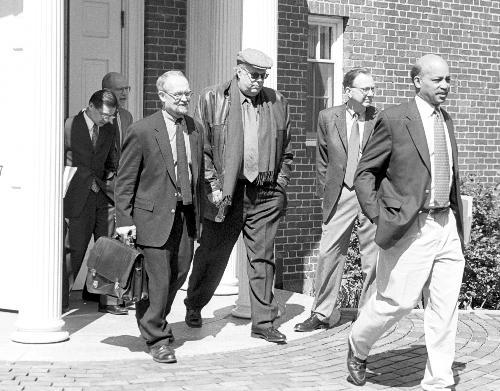
News
Summers Will Not Finish Semester of Teaching as Harvard Investigates Epstein Ties

News
Harvard College Students Report Favoring Divestment from Israel in HUA Survey

News
‘He Should Resign’: Harvard Undergrads Take Hard Line Against Summers Over Epstein Scandal

News
Harvard To Launch New Investigation Into Epstein’s Ties to Summers, Other University Affiliates

News
Harvard Students To Vote on Divestment From Israel in Inaugural HUA Election Survey
Robert Rubin Named to Corporation
Citigroup chair will replace 27-year corporation veteran Stone

Robert E. Rubin ’60—mentor and long-time booster of University president Lawrence H. Summers—was confirmed yesterday morning as the newest member of the Harvard Corporation.
The Board of Overseers formally approved Rubin’s selection during a regular meeting at Loeb House.
Rubin will assume his post on the University’s highest governing board on July 1, when Robert G. Stone Jr. ’45 ends his 27-year tenure on the body.
Rubin’s appointment comes after a long courtship by the University. Rubin said he was initially approached about joining the Corporation when he stepped down as secretary of the treasury in July 1997.
But Rubin’s appointment now—with Summers at the University’s helm—takes on greater significance.
Summers was Rubin’s deputy at the treasury department, and the two shared an especially close friendship.
Rubin is credited with smoothing the many rough edges of Summers’ personality that were noted in his first years in Washington. Rubin handpicked Summers as his successor as secretary.
Last year, Rubin again pushed for Summers, contacting members of the Harvard presidential search committee to assure them that Summers’ years in government had softened his aggressive edge.
Harvard officials and other observers said that the pair’s close relationship will be an asset.
“President Summers respects Mr. Rubin’s judgement,” Stone said. Their relationship, he said, will be “very positive” for the University.
Summers’ may benefit personally as well.
As a Corporation member, Rubin again will be in a position to influence and advise Summers, who has drawn criticism for his leadership style during his first year as president.
“Given the problems Summers is running into, having someone who can smooth Summers out might not be such a bad thing,” said one source familiar with the University’s administration.
While it is rare to have a Corporation member so closely associated with the president, Rubin said that their relationship would not stand in the way of fulfilling his oversight duties as a member of the Corporation.
In an interview this afternoon, Rubin said he didn’t foresee any conflict stemming from his close relationship with Summers.
“Larry and I have agreed and disagreed on issues for better than 25 years,” he said.
And Rubin looks forward to working with Summers and helping to manage an institution of Harvard’s size and prestige, he said.
“Harvard is a great University—a true global resource—that plays an enormous role in furthering inquiry, understanding and debate across the entire spectrum of intellectual pursuits,” Rubin said in a statement.
Rubin’s predecessor said he is excited at the selection—which helped make.
“If I could choose anybody in the world to replace me, it would be Bob Rubin,” Stone said. “He’s an absolutely wonderful person with great judgement.”
Rubin said his experience both in government and in the corporate world—he currently serves as chair of the Executive Committee at Citigroup—qualifies him to help oversee the University and its $18.3 billion endowment.
“Every institution is different and academic institutions are very distinct, but I’ve spent a lot of time around big institutions and there is some commonality,” Rubin said.
Harvard’s president agreed with Rubin’s assessment.
“I know from experience that his wisdom and judgment, as well as his understanding of how complex organizations work, will serve the University extremely well,” Summers said in the statement.
Rubin, 63, graduated summa cum laude in economics from Harvard in 1960. He also studied at the London School of Economics and Yale Law School.
In his Commencement address last year, Rubin said his time at Harvard was transformative.
Rubin joined Goldman, Sachs & Co. in 1966, where he stayed for 26 years. In 1993 Rubin left for Washington, where he lead the National Economic Council until he was named secretary of the treasury in 1995. In 1997 Rubin returned to Wall St., taking a position at Citigroup.
Rubin also previously served as a director of the Harvard Management Company which manages Harvard’s $18.3 billion endowment.
As a corporation member, Rubin will be one of seven individuals ultimately responsible for the operation of the University, discussing and approving matters as broad as Summers’ plans for Allston and as specific as rules governing library access.
Rubin said yesterday that it would be premature for him to weigh in on long-range issues to be decided by Corporation.
Rubin’s selection came after a three-month search, but Rubin was likely a favorite early on.
Rubin said he discussed joining the Corporation with members D. Ronald Daniel and Stone in a meeting this winter.
Despite Rubin’s appointment, the Corporation still has another seat to fill after Friday’s announced resignation of Herbert S. “Pug” Winokur ’64-’65 (see related article, page A-1).
HarvardWatch, a student group affiliated with the Progressive Student Labor Movement, plans to protest what it calls the Corporation’s “undemocratic and unaccountable” processes outside today’s Corporation meeting in Loeb House.
“The Harvard Corporation has many white male businessmen, and I don’t know why we need another one,” said Benjamin L. McKean ’02, a member of HarvardWatch said.
—Staff writer David H. Gellis can be reached at gellis@fas.harvard.edu.
—Staff writer Catherine E. Shoichet can be reached at shoichet@fas.harvard.edu.
Want to keep up with breaking news? Subscribe to our email newsletter.
